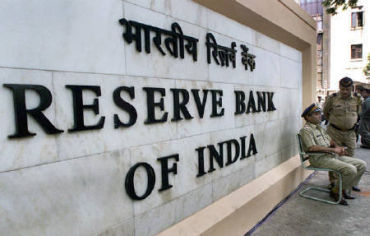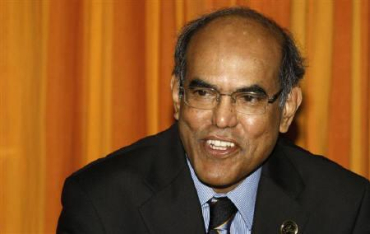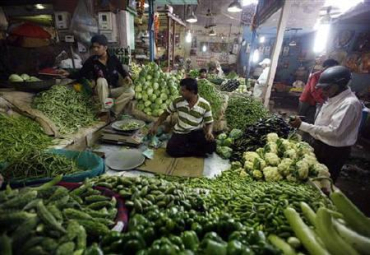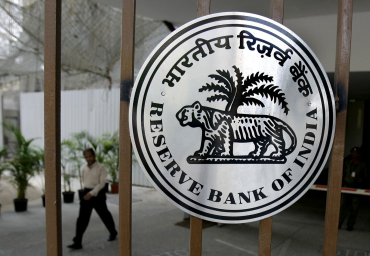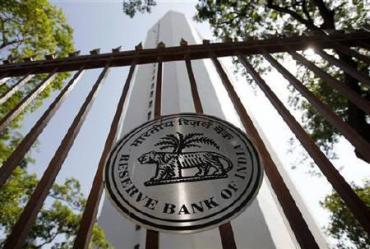 | « Back to article | Print this article |
RBI is caught between inflation and global slowdown
Central banking is an important but thankless job, especially when it has to navigate, as in India's case, through unnecessary challenges created by a government that appears to have become a question mark. Poor Reserve Bank of India continues to be at the receiving end of criticism - unjustified at times - for the high and still rising Wholesale Price Index-based inflation and, depending on who you talk to, for either raising interest rates too much or not raising them enough.
The interpretation of how the domestic and global economic landscape has changed since the RBI's last review in mid-June holds the key to the central bank's action at the quarterly review of monetary policy on July 26.
The forthcoming meeting is the first since the government mustered some political courage to increase fuel prices.
The move also indicated some effort to check the fiscal's undermining of monetary tightening.
Central banks' guidance in their policy statements should be viewed as a tapestry of their evolving thinking as the economic cycle evolves.
In its last policy statement, the RBI maintained a hawkish stance, felt inflation was uncomfortably high and that it remained its key focus.
While it acknowledged some moderation in growth, the slowdown was not interpreted to be either broad-based or undesirable.
Click NEXT to read more...
RBI is caught between inflation and global slowdown
Finally, the RBI correctly flagged up the concern that global developments could pose a risk to India's growth, but these were not meaningful enough to take its eyes off the multi-headed inflation devil.
How have economic conditions changed since the last policy review? Domestically, industrial production and the Purchasing Managers' Index survey indicate further moderation in the growth momentum, as desired by policy.
Unfortunately, India's industrial production data continue to show too much volatility and sizeable revisions, and probably exaggerate the pace of moderation.
Indeed, RBI Governor D Subbarao aptly labelled these revisions as "analytically bewildering".
However, direct and indirect tax collection in April-June hints at a better tone of aggregate demand than what industrial production indicates.
Still, just as the post-crisis recovery was uneven, the ongoing deceleration, too, is uneven.
More importantly, WPI inflation remains uncomfortably high and actually accelerated in June.
It will increase further in July as the more complete impact of the recent hike in fuel prices is captured. WPI inflation increased to 9.4 per cent year-on-year in June from 9.1 per cent in May.
At 7.2 per cent year-on-year in June, WPI core (non-food manufacturing goods) inflation was similar to 7.3 per cent in May.
Click NEXT to read more...
RBI is caught between inflation and global slowdown
Equally worrying is the pattern of revisions in the preliminary WPI. April inflation figures were revised significantly higher to 9.7 per cent from 8.7 per cent.
The magnitude of revisions so far in 2011 has averaged around an outsized one percentage point, which should raise qualitative issues with the new WPI data as well.
Overall, inflation should remain the RBI's key focus, and it cannot just shy away from increasing rates when inflation remains near-double digit, has actually risen and revisions to the inflation data remain worryingly high.
Globally, the recovery in the US is losing momentum and the European sovereign issues are becoming more serious by the day.
Brent crude oil is slightly higher than where it was at the time of the last RBI review, and the local pass-through remains incomplete.
Also, "suppressed inflation" remains a concern since, among other overdue adjustments, electricity tariffs will also need to be raised.
Overall, the global backdrop warrants close tracking but cannot be an immediate reason for the RBI to not increase rates, especially given expectations of further acceleration in inflation.
Admittedly, significant global financial dislocation could prompt the RBI to hold fire but that outcome is conditional on events outside the RBI's control.
Click NEXT to read more...
RBI is caught between inflation and global slowdown
Until then, the apex bank should remain focused on what it can do.
It is striking that core WPI inflation has been moving higher in the past several months, despite the deceleration in industrial production growth since early last year.
This should call into question the sensitivity of input price inflation to growth. The RBI remains in a dysfunctional marriage with WPI inflation for setting its interest rate policy.
Indeed, the signs of moderating growth are not new, but local financial markets appear less perturbed by rising headline and core inflation than they were a few weeks ago.
The key difference is the air pocket that global commodities have hit, not deceleration in growth as the local idiot box keeps blaring.
Actually, the latest increase in core WPI inflation - on the RBI's own guidance - should indicate further strengthening in demand pressures.
However, this is an interpretation I do not fully subscribe to and the RBI will probably soon be haunted by it.
While domestic demand conditions affect the magnitude of pass-through by businesses, by relying on WPI, the RBI is focusing on input prices. Instead, monetary policy should focus on final prices of consumer goods.
It is far from certain that incremental deceleration in growth will positively affect WPI inflation if global commodity (especially crude oil) prices remain elevated or rise further.
Click NEXT to read more...
RBI is caught between inflation and global slowdown
A crucial aspect of the upcoming policy will be the RBI's guidance. It is still early to take a final call on the unfolding monsoon season.
However, risks from global factors could be two sided.
A crisis in Europe could cause commodity prices to correct, thereby offering scope of a breather for the RBI.
At the other extreme, adoption of more monetary easing in the US could cause commodity prices to move higher, thereby warranting further tightening by the RBI.
The global risks mentioned above warrant mutually exclusive responses from the RBI. Besides, there is uncertainty about the timing and outcome.
The central bank should adopt a wait-and-see approach after hitting eight per cent on the repo rate as soon as possible.
The bottom line is that a rate hike is a must next week since there is hardly anything to cheer about on inflation to either pause or signal a pause just yet.
The author is senior economist at CLSA, Singapore
The views expressed are personal
